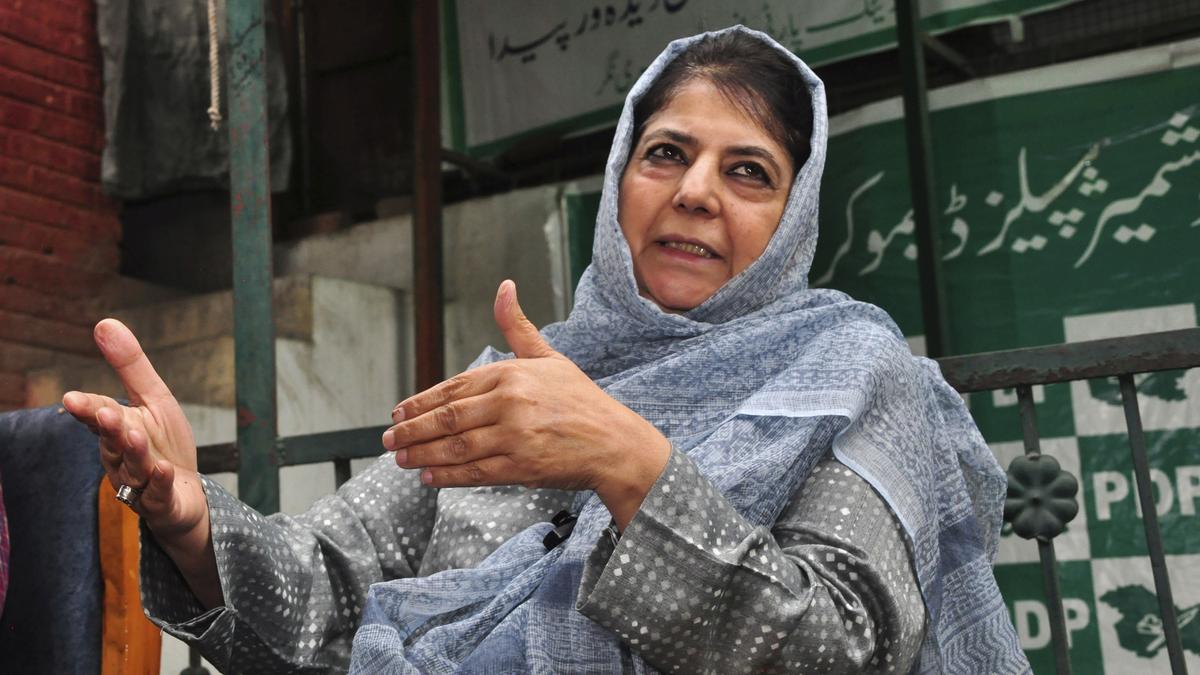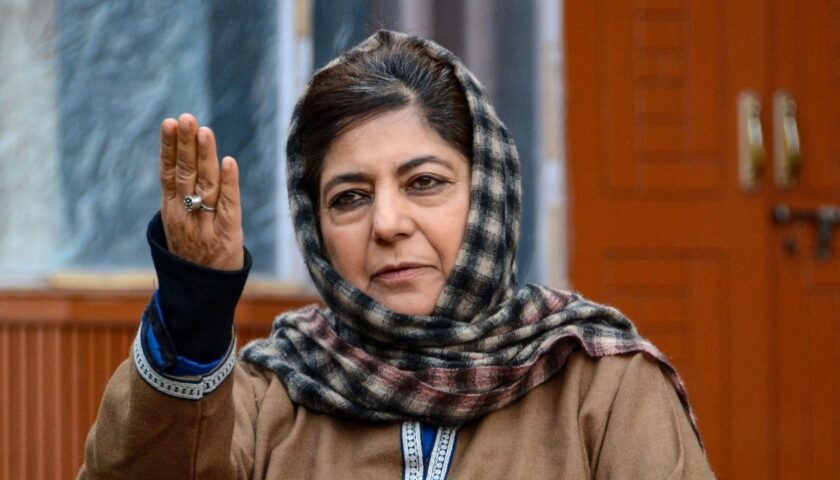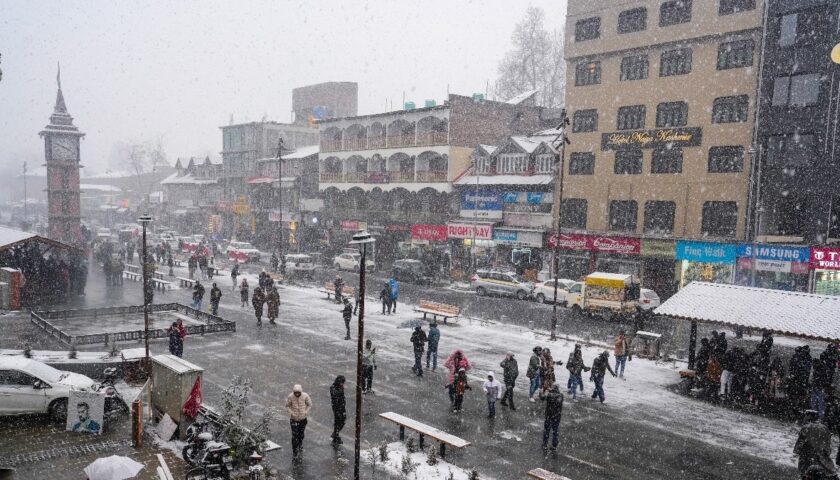A New Political Equation: PDP Extends Support to NC Government
By: Javid Amin | 10 October 2025
In what could mark the beginning of a new phase in Jammu and Kashmir’s evolving political landscape, Peoples Democratic Party (PDP) president Mehbooba Mufti has publicly declared her party’s readiness to support the National Conference (NC)-led government in safeguarding the region’s land, jobs, and natural resources.
Her remarks, delivered at a press conference in Srinagar, come at a time when the region continues to grapple with uncertainty over restoration of full statehood and autonomy following the 2019 constitutional changes.
“The government should come forward and bring a Bill. We should together try to save our land, jobs, and resources. The PDP is ready to provide its full support to the government on this issue,” Mehbooba Mufti said.
This statement marks a rare moment of political alignment between two long-time rivals, the PDP and the National Conference — suggesting that core regional interests may now be taking precedence over party politics.
The Context: Between Statehood and Survival
For Jammu and Kashmir, the debate over statehood restoration has dominated the political discourse since August 5, 2019, when Article 370 was abrogated and the erstwhile state was reorganized into two Union Territories.
While the Supreme Court upheld this move in December 2023, it also recorded the Centre’s assurance that statehood would be restored “at an appropriate time.”
However, as months have passed without a clear timeline, public anxiety has grown over the region’s land ownership laws, employment safeguards, and control over local resources.
The NC-led government, which came to power in late 2024, has repeatedly emphasized its commitment to restoring statehood, yet tangible legislative protections for land and job rights have not been enacted.
Mehbooba Mufti’s intervention directly addresses this gap between rhetoric and action.
“We cannot wait endlessly for statehood while our land and resources are being taken away. Until restoration happens, we must safeguard our rights through the Assembly,” she asserted.
What Mehbooba Mufti Proposes: Legislation Over Lip Service
At the heart of Mehbooba Mufti’s appeal lies a simple yet powerful message: legislate, don’t just debate.
She has called on the NC-led government to bring a formal Bill in the Jammu and Kashmir Assembly that protects local rights over land, jobs, and natural assets — instead of relying on symbolic statements or resolutions.
According to PDP sources, Mehbooba has proposed comprehensive legislative measures, including:
-
Land Protection Act: To ensure that only state subjects or permanent residents can purchase agricultural or residential land.
-
Employment Reservation Framework: To prioritize domicile-based employment in government and semi-government sectors.
-
Resource Management Bill: To regulate mining, water, and forest rights, ensuring local communities remain stakeholders in their natural wealth.
While the PDP has already introduced a Private Member’s Bill addressing parts of these issues, Mehbooba insists that the government itself must own the responsibility.
“The onus is on the government to take the lead. This should not be about political credit but about protecting our collective future,” she said.
Political Implications: From Opposition to Partnership
The PDP’s offer of cooperation carries deep political implications.
Historically, the National Conference and PDP have represented competing visions for Jammu and Kashmir’s autonomy and governance. Their rivalry shaped much of the region’s post-2002 political history.
Yet, Mehbooba Mufti’s statement suggests a shift toward pragmatic politics — one that prioritizes regional interest over electoral positioning.
This move could lay the foundation for a cooperative legislative front on issues like land reform, employment, and social justice.
Analysts interpret this as the emergence of a “Kashmir First” strategy, where issue-based collaboration replaces ideological rigidity.
Dr. Zaffar Ahmad, a political commentator from Srinagar, observes:
“Mehbooba’s outreach is both tactical and symbolic. It challenges Omar Abdullah’s government to act while signaling that the PDP remains a relevant, constructive player in J&K politics.”
Inside the Assembly: Pressure Mounts on the NC Government
Mehbooba’s remarks come at a time when the Omar Abdullah-led government faces growing public frustration over its slow pace of reform and unmet electoral promises.
Citizens have repeatedly voiced concerns about unregulated land transfers, delayed job recruitments, and weak implementation of welfare programs.
The PDP’s public offer of support now puts moral and political pressure on the ruling NC to take tangible legislative action.
If Omar Abdullah’s cabinet fails to introduce a comprehensive safeguard bill, it risks being accused of political hesitation and symbolism over substance.
According to insiders, several NC legislators privately welcome the idea of a bipartisan protection bill, viewing it as a way to unite regional sentiment while cornering the BJP-led opposition in the Assembly.
Land, Jobs, and Resources — The Core of the Concern
01. Land Protection
Since the 2019 reorganization, several administrative orders have eased land ownership restrictions, sparking fears of external acquisition and demographic change.
Public protests and civil society petitions have demanded safeguards akin to those that existed under Article 35A.
A Land Protection Bill would aim to restore these restrictions legislatively, ensuring that only domiciles can own or transfer immovable property in the region.
02. Employment Safeguards
With rising unemployment and competition from non-local applicants, there is a growing call for exclusive recruitment zones for J&K domiciles in public sector jobs.
Such a policy could stabilize the job market and curb migration pressures.
03. Resource Ownership
The debate extends to mining contracts, hydroelectric projects, and forest rights, where locals often feel sidelined.
PDP proposes that resource licensing and revenue-sharing should prioritize local entrepreneurs and communities.
Together, these three sectors form the economic backbone of Jammu and Kashmir, and protecting them could rebuild public trust in democratic governance.
Political Psychology: From Protest to Policy
Mehbooba Mufti’s tone signals a strategic evolution in her political approach.
Once seen as the face of confrontation with Delhi, she is now positioning the PDP as a policy-driven opposition — ready to collaborate for tangible results.
This marks a deliberate shift from protest politics to participatory governance.
It reflects an understanding that in post-Article 370 Jammu and Kashmir, policy wins matter more than political rhetoric.
“We are not against anyone; we are for our people,” Mehbooba reiterated.
“If the NC government takes steps in the right direction, we will stand by them — because what’s at stake is not power, but our identity.”
Reactions Across the Political Spectrum
National Conference Response
An NC spokesperson welcomed Mehbooba’s remarks cautiously, saying the party “appreciates constructive suggestions” and remains “open to consensus on matters of regional importance.”
However, NC insiders indicate that Chief Minister Omar Abdullah is wary of being seen as dependent on PDP’s support, preferring to frame any legislative initiative as government-led, not opposition-driven.
BJP’s Take
The BJP, currently in opposition, dismissed the development as a “political stunt,” accusing both NC and PDP of “manufacturing unity to hide governance failures.”
Yet political observers note that the BJP’s discomfort stems from the potential for regional solidarity, which could weaken its narrative dominance in Jammu and Kashmir.
Civil Society & Public Opinion
Among the public, Mehbooba’s remarks have drawn measured approval.
For many residents, the possibility of joint legislative protection for land and jobs offers hope after years of policy uncertainty.
A shopkeeper in Anantnag summed it up succinctly:
“We don’t care who brings the Bill — NC or PDP — as long as someone protects our rights.”
Historical Context: The Arc of Autonomy and Safeguards
To understand the current debate, it’s essential to revisit Jammu and Kashmir’s constitutional history.
For decades, Articles 370 and 35A provided a legal framework that preserved land ownership restrictions and exclusive employment rights for residents.
Their removal in 2019 triggered widespread concern about demographic vulnerability and economic marginalization.
While the Supreme Court’s 2023 ruling upheld the constitutional validity of abrogation, it did not address socioeconomic protections, leaving them open to legislative discretion.
Mehbooba’s proposal essentially seeks to recreate those protections through local law, within the constitutional framework that now exists.
Potential Political Outcomes
If the NC government accepts PDP’s offer and introduces a comprehensive protection bill, it could lead to:
-
A landmark bipartisan consensus in the Assembly.
-
Strengthened INDIA bloc coordination between NC, PDP, and Congress.
-
Renewed voter confidence in regional governance.
Conversely, if the NC government fails to act, PDP could use the issue to corner the ruling party politically, framing it as indifferent to people’s real concerns.
Either way, Mehbooba Mufti’s statement has shifted the political conversation — from abstract statehood debates to concrete legislative action.
What Lies Ahead
Over the coming weeks, the focus will shift to the J&K Assembly, where PDP legislators may push for discussion on their Private Member’s Bill.
Whether the NC government reciprocates by tabling an official Bill remains to be seen.
Meanwhile, public expectations are rising.
Citizens, weary of empty assurances, are looking for visible results — employment drives, land protection rules, and policy reforms that impact daily life.
As one Srinagar university professor put it:
“This is the first time in years that the discourse has turned to governance, not grievance. That’s progress.”
Bottom-Line: A Moment for Pragmatism, Not Posturing
Mehbooba Mufti’s outreach marks a pragmatic turn in J&K politics — one rooted in shared survival instincts rather than ideological divides.
Her message resonates because it articulates what many in the region feel: that protection of land, jobs, and resources cannot wait for larger constitutional settlements.
By offering cooperation to the NC government, the PDP has opened a path for functional unity, where legislative action may finally begin to replace years of political paralysis.
In a Union Territory still searching for stability and identity, this could well be the start of a new chapter —
where politics serves people, not positions.




